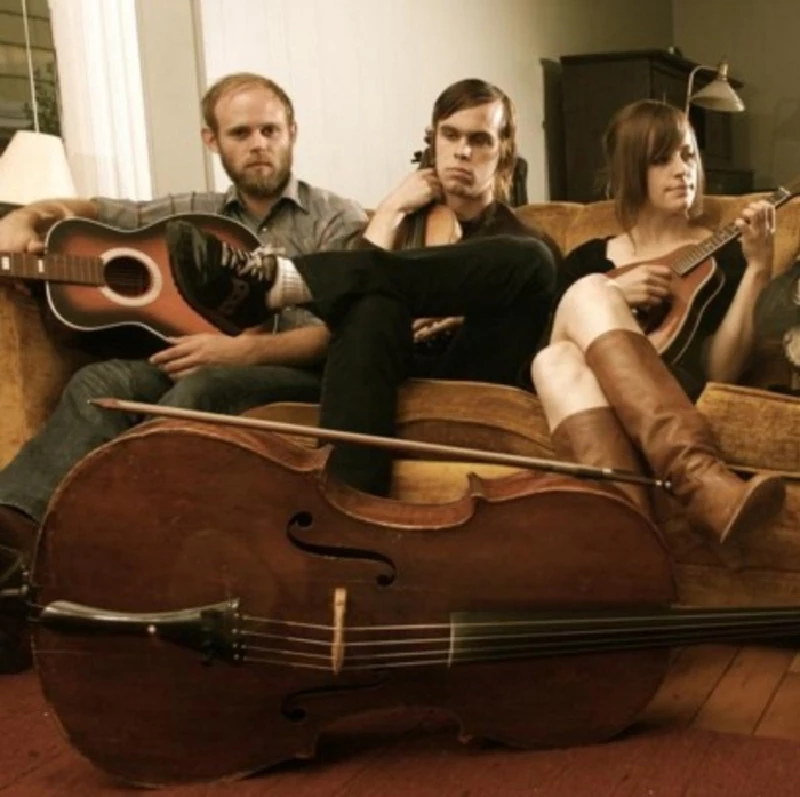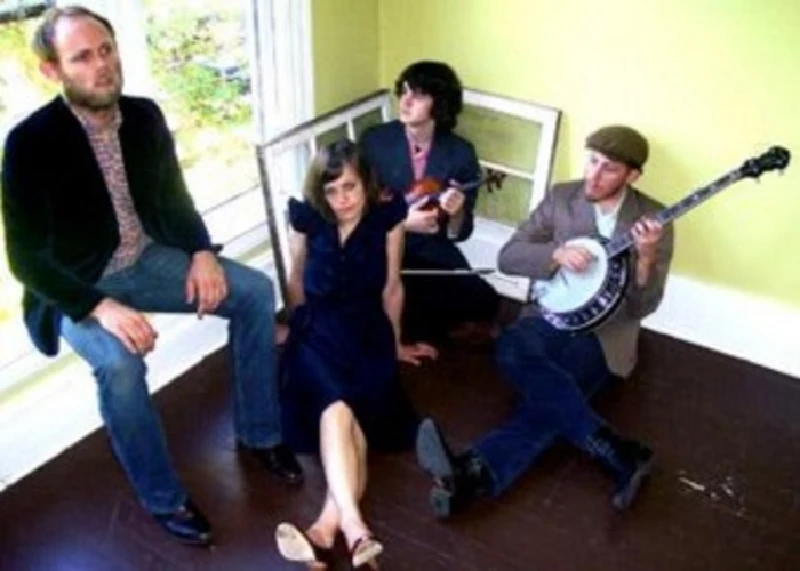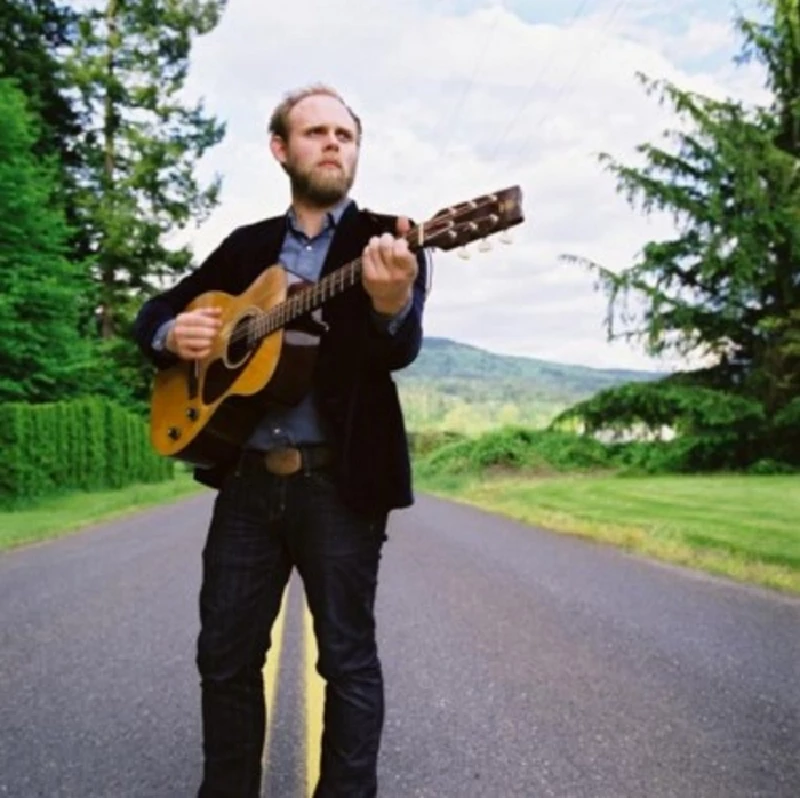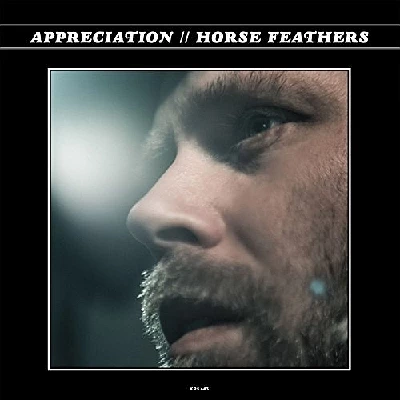Horse Feathers - Interview
by Benjamin Howarth
published: 19 / 3 / 2009

intro
Justin Ringle, the singer with American acclaimed acoustic pop act Horse Feathers, speaks to Ben Howarth at a show in London about his group's second alabum, 'House With No Name'
Horse Feathers are one of those odd bands that aren’t a solo project exactly, but are clearly driven by a single person. Justin Ringle is the band’s songwriter, and he has then worked with the arranger, composer and (now) solo singer-songwriter Peter Broderick. Not exactly a household name, admittedly, Peter Broderick has seen deserved acclaim for his dreamy acoustic pop. Fans of his album 'Home' (Bella Union, 2008) will also enjoy his arrangements on Horse Feather’s ‘House With No Name’ (Kill Rock Stars, also 2008). But the band has now moved on. I met Justin before he played London’s Luminaire venue in March, on his band’s second tour of the UK, where he was joined by a new string section (Nathan Crockett on violin and Catherine O’Dell on cello). Later in the evening, they played to a packed house, who listened eagerly to these sad quiet acoustic songs. I suspect that Broderick’s departure will be missed less than you may think. It seems that Ringle has a good relationship with his new band, Crockett in particular. There was a nice moment in the show when Nathan and Justin had to work together to re-tune the guitar. Justin thought he had it, but his violinist insisted that it still wasn’t quite right. "This kid has perfect pitch", he joked, "and I really don’t!" Justin is a good songwriter, but he has been sensible enough to realise that people with traditional music skills will add a lot to his skills, and it is that realisation that allows his quiet folk songs to stand out from an ever-expanding pack. I began the interview by asking when Justin began writing songs, and what made him want to become a songwriter. JR : I’ve been writing songs since I was seventeen, but I started writing songs in this style of acoustic based music when I was 23. I had played in a band in college, and then I moved to Portland, Oregon. After college, I was unemployed and I just broke down! I wrote most of the songs from the first record during that time, just alone in my room. I was just doing music solo until I met Peter Broderick. We became room mates actually and I started playing with him as an accompanist, and eventually his sister started playing with us as well. Now I play with these guys and we have another member of the band back home. PB : I read that you began playing at open mic shows. I don’t think I have met many bands that had done that. I assume you were playing your own songs? JR : Yeah, I was just playing my own stuff, just by myself, in coffee shops back in Portland. I just tested things out. PB : I would imagine that can be fairly difficult. JR : It is, it is kind of a trial by fire. You have just a moment to convince people to start listening to you, and that’s pretty good practice for the early shows you play as a band. PB: Now, you have two albums out. Is there a big difference between the two? JR: No, not necessarily. I would say that the second one offers a progression from the first ('Words are Dead', 2007-Ed) in that, although it is stylistically pretty similar, it is a little bit more textured and layered. I would say that it is a bit more of a studio album. The first album involved us capturing the songs as they sound live, with a few overdubs, while this second album was built up a little bit more. PB : Both these albums were arranged by Peter Broderick. How do you go about that. Do the pair of you sit and write the music together? JR : I would pretty much present complete songs to Peter, with all my parts worked out. Then I would see what he would come up with, and sometimes I’d amend the songs a little to allow the string parts to work. PB : Are you intending to continue working with him, even now that you have a new band playing with you live? JR : I think he is pretty much fully booked these days. He has his own solo stuff now, so its probably unlikely. But I’ve been playing with these guys for different amounts of time- I’ve played with Nathan now quite a while. He did the last UK tour as well, while I’ve been playing with Cat for six months or so. CO’D : About that, maybe a little less actually. PB : Are you assuming that this will be the next studio band? JR : Working on it! I hope so, yeah. PB : Are you now thinking ahead to the next record? JR : Definitely, I hope for the next album to come out in Spring 2010, so we will probably record it over the summer. I began working on a bunch of material before this tour, and we’re now working it up. I expect it to change a little bit, though not wildly. I feel that as this is going to be the third album, we could make a few larger steps. PB : How do you write songs ? Do you start with an idea that you want to get across or do you just start building songs up from little melodies or ideas for words ? JR : I tend to start with a tune first, and really focus on the melodies. I tend to then build up the words and the tunes at the same time, although sometimes I come back to them later to fit specific lyrics in. I certainly don’t write lyrics first that I fit to a song. The melody is always the most important part. PB : Do the songs continue to change over time, the more you play them? JR : Yeah, in particular the songs from the first album. We still play half of our set from that record, and the songs have definitely altered over time. I enjoy that, because sometimes when you record a song it feels almost dead because you know it just how it sounded at that time. Sometimes it takes a bit of revision, slight changes, just to keep it interesting for us. PB : When you play live, are you sometimes surprised by how people react to songs, perhaps if their favourites are the ones you least enjoy ? JR : (Pauses) Sometimes…. I’m sometimes surprised by people’s reactions. But I like playing them all. What do you think, Nathan ? NC : Each song has its own thing. For me, the songs that have the most intensely orchestrated string parts are the most fun to play, but the other songs, where there is a simpler part, there can be a more emotional reaction from the audience. I suppose most people enjoy the slightly louder songs when we play live. JR : That is generally true. We have a lot of very quiet songs, and often it is the louder moments that get the biggest response. But sometimes we’ll play in a ‘listening room’ with a seated audience, and the quietest songs then have the most weight. PB : Does the nature of the crowd, particularly how well they seem to know the music, change the way that you play it? JR : I wouldn’t say it changes the way I play it, but it definitely changes my mood. It’s a lot more fun to play to people that know the music a little bit. I think every band would say that its good to play to fans. NC : Its also very good to play to people and then talk to them afterwards, especially people that didn‘t know the music before who were won over. JR : It is definitely a good feeling to convert people. PB : In the UK, we read a lot of articles about Portland’s music scene. I wonder if it doesn’t sometimes get romanticised a bit. Is it a good place to be in a band ? JR : There’s a lot of music going on there. From touring the US, I feel like Portland and Brooklyn have the most creative communities. Everybody seems to be doing something. Portland is the cheapest metro area to live in on the West Coast, so perhaps that makes it a magnet for people like that. There has definitely been a mass migration there in the last five years, and now it seems there is more attention for what has been going on for a while. But I wouldn’t say I worked especially closely with the other bands there. It seems that we’ve been touring so much that actually we’ve played in Portland very little. When the band started, there was a group of bands that we played with often and it did feel like a scene, but now they are also off touring. In Portland, its seems that everybody is playing music, and every style is represented. I suppose that acoustic based music is especially popular. PB : Do you like all this touring, or is just a necessity of wanting to make albums ? JR : I do enjoy it, even if there are obviously times when you find it is nice to be home. I like the dual lifestyle, between being at home and being on the road. I think touring has to take priority. PB : Is playing live exciting ? Do you get nervous at all? JR : I don’t get nervous any more. Always a little bit, I suppose, but never deeply anxious or anything. PB : What big goals do you have for your music ? JR: Hmmm… I don’t have any big goals. I want to make honest music that I like, where I don’t have to cater to people’s tastes or to the need for financial success. Ideally, I would like a career where I wouldn’t have to worry about that. I would just be able to play and be able to make the music I like. PB : You were one of the first bands that I found just by looking on music blogs and downloading samples. Do you think this changes the way you write ? Are you conscious of the fact that people may not be listening to complete albums anymore ? JR : It is good that people use the internet, I think more music gets listened to now. But I’m really devoted to the idea of a complete album. When I write songs I don’t just see them on their own, I’m working on them as part of a complete set that will make up an album. PB : Thank you.
Band Links:-
https://en-gb.facebook.com/horsefeatherstheband/http://horsefeatherstheband.com/
https://www.instagram.com/horsefeatherstheband/
Picture Gallery:-


reviews |
|
Appreciation (2018) |

|
| Fantastic sixth and potential breakthrough album for indie folk/country act Horse Feathers |
| Thistled Spring (2010) |
most viewed articles
current edition
Carl Ewens - David Bowie 1964 to 1982 On Track: Every Album, Every SongArmory Show - Interview with Richard Jobson
John McKay - Interview
Colin Blunstone - Thalia Hall, Chicago, 16/7/2025
Billie Eilish - O2 Arena, London, 10/7/2025
Bathers - Photoscapes 1
Visor Fest - Valencia, Spain, 26/9/2025...27/9/2025
Loft - Interview
Sir Tim Rice - Interview
Robert Forster - Interview
previous editions
Manic Street Preachers - (Gig of a Lifetime) Millennium Stadium, Cardiff, December 1999Heavenly - P.U.N.K. Girl EP
Beautiful South - Ten Songs That Made Me Love...
Peter Perrett - In Dreams Begin Responsibilities Interview Part One
Boomtown Rats - Ten Songs That Made Me Love....
Oasis - Oasis, Earl's Court, London, 1995
Trudie Myerscough-Harris - Interview
Coldplay - Wembley Arena. London, 16/8/2022
Prolapse - Interview
Pixies - Ten Songs That Made Me Love...
most viewed reviews
current edition
Davey Woodward - Mumbo in the JumboSick Man of Europe - The Sick Man of Europe
Lucy Spraggan - Other Sides of the Moon
Suzanne Vega - Flying With Angels
Amy Macdonald - Is This What You've Been Waiting For?
Phew, Erika Kobayashi,, Dieter Moebius - Radium Girls
Bush - I Beat Loneliness
Blueboy - 2
Alice Cooper - The Revenge of Alice Cooper
Cynthia Erivo - I Forgive You
Pennyblackmusic Regular Contributors
Adrian Janes
Amanda J. Window
Andrew Twambley
Anthony Dhanendran
Benjamin Howarth
Cila Warncke
Daniel Cressey
Darren Aston
Dastardly
Dave Goodwin
Denzil Watson
Dominic B. Simpson
Eoghan Lyng
Fiona Hutchings
Harry Sherriff
Helen Tipping
Jamie Rowland
John Clarkson
Julie Cruickshank
Kimberly Bright
Lisa Torem
Maarten Schiethart